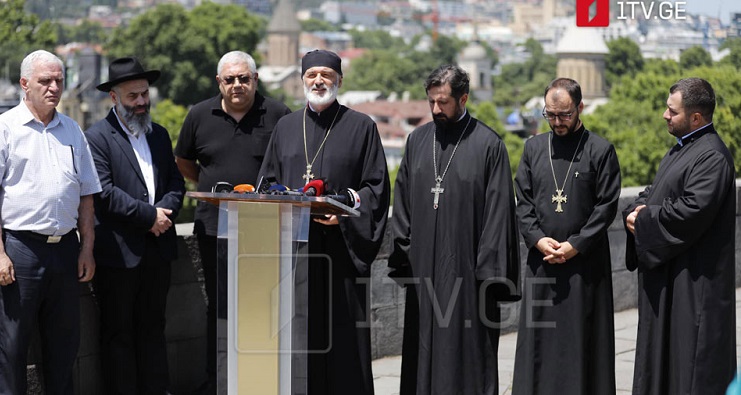Orthodox Church Patriarchate, religious denominations call for legal regulations on “LGBT propaganda”

The representatives of the Patriarchate of the Georgian Orthodox Church and several other religious denominations on Friday gathered in the yard of Tbilisi Metekhi church to call for legal changes against “LGBT propaganda”. Photo: 1TV
The Patriarchate of the Georgian Orthodox Church and several other religious denominations in the country on Friday claimed Tbilisi Pride, the LGBTQ rights group that organises the annual festival of the same title, was engaged in “changing the cultural code” rather than protecting the rights of sexual minorities, and called for legal changes to address the “propaganda” and “prevent threats” to “civil peace”.
Making the claim on the backdrop of the ongoing Tbilisi Pride Week in the capital city to promote the rights of sexual minorities, Andria Jagmaidze, the head of the Public Relations section of the Patriarchate, claimed the “LGBT propaganda” by the domestic organisation had been a source of “severe polarisation and violence” over the years.
Accusing the NGO of “far-reaching plans under the mask of protection of human rights, tolerance and acceptance”, Jagmaidze alleged examples of “several foreign states”, where he said such organisations had been set up and “demonstrated their genuine intention to promote a perverted lifestyle, including [LGBTQ] propaganda among the youth, same-sex marriages, adoption of children by sexual minorities, and general changes to the cultural code”.
We have gathered here to declare once again the public cannot accept this and will never tolerate such an approach. Thus, we believe the issue should be regulated by the law”, the cleric said while pointing to Georgia's tolerance to ethnic minorities and “unacceptability of any form of violence”.
Tbilisi Pride announced it would celebrate a “month of dignity and pride” by holding the Pride Week event in Tbilisi between July 1-8. The organisers said the celebrations would only involve closed events of “cultural, academic and political nature”, without a public demonstration.
 Tweet
Tweet  Share
Share